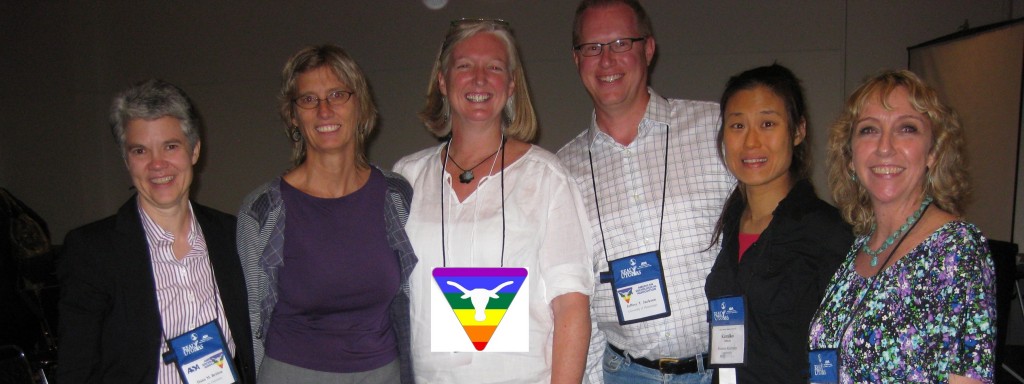
UT Austin citizens past and present: Dana Britton (Professor, Rutgers), Christine Williams, (Chair, UT Sociology), Kirsten Dellinger (Chair, Univ of Mississippi), Jeff Jackson (Assoc Prof, Univ of Mississippi), Kumiko Nemoto (Associate Professor, Western Kentucky University), and Patti Giuffre (Professor, Texas State)
Graduate Coordinator Evelyn Porter’s ASA report:
My focus this year at ASA was the Director of Graduate Studies meeting and networking with UT Austin alums at the Departmental Alumni Night. Many thanks to those of you who stopped by our table to say hello, it was great to see you! Next year in New York, we will have a reception, so plan to attend.
The most valuable part of the conference for me was the DGS meeting. I discovered (much to my delight) that UT Austin has substantial student support systems in place that many other universities have not developed. These include: an annual reporting system for students and mentors; a blog and other social media outlets; student-led brown bags, panel discussions and research presentations; health and well-being forums and other community building events (Spiderhouse salon, lunch on the patio, afternoon teas). Most of these programs are collaborations between students, faculty and staff. UT Austin is better able to focus on graduate student health and well being because staff are willing and able to provide support that faculty are often too busy to initiate. Twenty-seven colleges and universities had representatives at the meeting and we were one of two with an annual reporting system in place for students and mentors. I was one of two staff members attending and it made me very appreciative of the resources UT Austin has at its disposal. Considering our 80 ASA presenters (primarily graduate students) at the conference and the department’s multi-year funding of admitted students, what we offer to students academically and financially far surpasses most other universities. Most universities are dealing with overt competition among students for TAships and RAships and are unable to offer multi-year funding packages. Additionally, we have been fortunate to fund professional development opportunities for conference presentations and workshops thanks to university and faculty largesse.
The DGS report this year was from the ASA Committee on the Status of Racial and Ethnic Minorities in Sociology. I was again impressed by the way our department embraces and exemplifies diversity in a healthy, collaborative community-minded environment.
From the Graduate Student Under Represented Minority survey:
Grad School to Faculty – career paths for Underrepresented members
How does physical and mental health among minority students and faculty impact their career paths? Too many students and faculty of color are dying young. Second tier publications from minority faculty include a lot of titles about marginalization and troubled journeys. What are the characteristics of mentoring that advance the career path of URM grad students into faculty roles? Support for URM students must include building cultural and institutional capital.URM students want to give a different lens to social problems. Students reported that the university did not value what they wanted to study. This was portrayed as having to fight for what they wanted to do. The framing was “we’re supportive” but nothing was done to further their research goals. Core committee members told one person to avoid controversial issues. Mentoring should include learning about health disparities, equity issues and language issues as well as gender and sexual minority perspectives.
What worked best was when students found the opportunity to learn the language of context, to conceptualize social change in a way that was understood by the academe. Supporting intellectual needs was found to be as important as funding and other forms of support. More focused support for the development of social and cultural capital, knowing how to ask questions, for instance is recommended. First generation students often don’t have the background or the desire to leave their cultural enclave. Discomfort must be acknowledged and assisted, class differences should be considered and thoughtful responses offered. Giving future faculty an understanding about how academia works, the dynamics of the academy is vital. Mentors who praise their students in front of their peers offer a boon to anyone on the market. Being merciless with insistence on the quality of writing while communicating that you care is also vital.
Positive experiences improve confidence and give a sense of belonging. Mentors can provide buffers to micro aggressions and perceptions of URM students as undeserving of “special” consideration:
• Provide practical skills for writing, analysis, grant-writing and collaboration techniques.
• Provide dominant cultural capital including: how to act and how not to act; what to expect; formal and informal rules of the academy and how to negotiate comments of racism, elitism, sexism and ethnocentrism.
• Reveal the supports, processes and dominant culture “inside scoop” that leads to success in the academy.
• Respect and support for diversity of thought and scholarship. The values and perspectives of new members of the academy must be incorporated.SREM reported grad student advice to programs:
• Listen to minority student voices – groups should meet with faculty to convey feelings
• Peer mentoring – other students providing social support
• Funding Support – systematic support for students with fellowships and research
• Better communication among various departmental constituents
• Faculty should publish with their students
• Adjusting and accounting for socioeconomic /cultural backgrounds
• More support for peer networks
• Inadequate race scholarship, need more courses on race theory
• Have a graduate student annual conference in which graduate students present their work.
While the graduate student survey addresses URM specific issues, most of the mentoring suggestions apply to all graduate students. I am heartened by the Sociology department’s dedication to furthering the scholarship and well being of its graduate students and look forward to collaborating with all of you to ensure our quality of life here at UT Austin remains superb.
